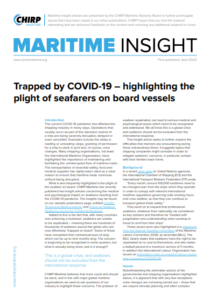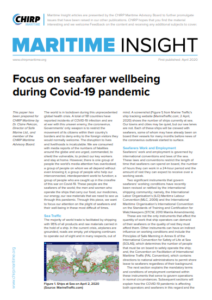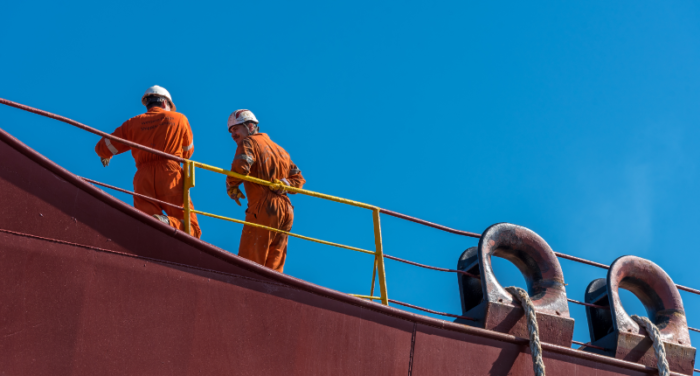Incident reporting scheme CHIRP Maritime has issued advisory papers for seafarers, covering technical and psychological issues related to the COVID-19 pandemic.
This is a global crisis, and seafarers should not be excluded from the international response.
CHIRP Maritime believes that more could and should be done. The problem of seafarer repatriation can lead to serious medical and psychological issues which need to be recognised and addressed.
If a crew change is not possible due to any combination of the issues discussed, crew must stay onboard and extend their contract. They may already have been at sea for many months and an extension can lead to all sorts of problems such as:
- Expiry of STCW certificates – many flag states have now arranged for certificates to be extended for a variable length of time and port state inspectors are understood to be adopting a pragmatic approach in this respect.
- Expiry of medical certificates – again most flag states have arranged for certificates to be extended. However, for seafarers on time-limited certificates, for example in order to receive scheduled tests for a known medical condition, this may mean that they cannot access planned medical care and may be at an increased risk of a medical event related to their underlying medical condition.
- Extension of period of service beyond 11 months. Whilst this may be necessary in extreme cases due to the reasons outlined above, if a good opportunity to change crew was not utilised, then this should be questioned by the appropriate authorities.
- Fatigue among seafarers may be associated with a decrease in efficiency, potential lack of concentration, and consequently an increased risk of accidents
- Demoralized crew who refuse to extend their contracts, but still have to stay on board because they are not able to disembark anywhere. There are examples of crew who are so actively opposed to being on board that their opposition destabilizes the general well-being of other crew members.
- Psychological issues such as anxiety, depression, lack of motivation and potential to harm themselves or others.
- Running out of regular medication, which is very difficult to obtain given the restrictions of access to shoreside services.
- Difficulty in accessing shoreside medical care for any medical issue, due to the restrictions described. Suddenly, treatment of a toothache or investigation and treatment of chest or abdominal pain become logistically challenging and seafarers may not be able to access shoreside facilities for optimal care. Medevac options are limited, and crew may need to be managed on board rather than being transferred ashore.
- Increasing concern amongst crew onboard for family and friends at home, and the strong desire to be with them in these strange times.
[adrotate banner=”313″]It should be noted that if a ship has been at sea with no contact with others for 14 days or more and all on board are well, it is highly unlikely that anybody on board will develop COVID-19. Crew joining the ship may introduce the virus and this uncertainty can cause stress and anxiety amongst the crew
In this regard, CHIRP advises that, where operators are planning to change crew, a full risk assessment must be carried out. This includes but is not limited to:
- International travel restrictions
- Restrictions to entering certain countries and gaining the appropriate visa to do so
- The potential need for quarantine on arrival in a country
- Issues affecting travel in a country, obtaining hotel rooms etc.
- The length of time crews have been on board, their experience and skill set and how effective they are as they approach the end of their contract
- Any medical or psychological issues of crew onboard that necessitate them leaving the ship as planned.
Explore more herebelow:

Seafarers during COVID-19 pandemic
In 2013, the MLC (2006) came into force and introduced an important protection for seafarers. It requires employers to draw up legally enforceable employment agreements with each seafarer, outlining the capacity in which they are to work; detailing the duration of their contract or if indefinite, the notice period; explaining their health and social security benefits; and many others.
By 16 March, shipping companies were reporting that all crew changes, worldwide, were stopped. Since this time, most seafarers have been unable to leave their ships to go home and new relief crews have been unable to join their ships to relieve those on board. Some estimates suggest that 150,00 seafarers are trapped at sea who were due to sign off have had their leave cancelled and remain onboard.
Seafarers are subject to the same restrictions on movement within their countries as other citizens are and are unable to leave their ship to travel home because airlines have grounded their fleets and nation states have stopped the flow in and out as well as the transit through their countries for non-native individuals.
Seafarers are also prevented from getting off the ship for shore leave when in port because of the virus transmission risk they may pose.
Those on board have to remain on board. Those ashore have to remain on shore. Those in port have to stay on the ship. Those in transit have to stay where they are no matter how near or far they are from home.
Negotiations are taking place at an international level between IMO, the ILO, ITF and the ICS to try and open corridors into and out of hub ports so that crew changes can take place, but as yet, the international maritime community has not managed to get key nation states to lift the travel restrictions they have levied.
Using the Job Demands – Resources model to analyse the impact on seafarers’ on board, we can conclude that the likely consequences of the pandemic on seafarers is to increase their exposure to the aspects of their jobs that cause harm and to remove or reduce the supports that can give them relief from their daily toil and anxiety about COVID-19.
Explore more herebelow:































































